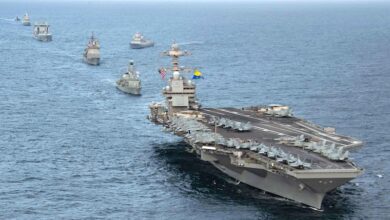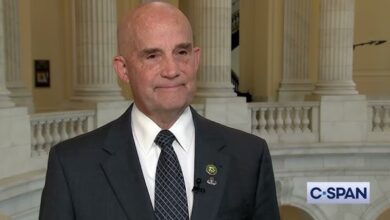A key ally of President Vladimir Putin is becoming increasingly outspoken in his criticisms of the Kremlin over its execution of the war in Ukraine.
The news comes as Russia seemingly retreats from suburbs around the Ukrainian capital and other areas of the country.
Ramzan Kadyrov’s willingness to criticize top Kremlin officials directly, and thus indirectly criticize Putin, is notable. It reveals rising tensions in Russia’s elite over the absolute failure to subjugate Ukraine.
The leader of the Russian republic of Chechnya, Kadyrov is a former rebel who fought against Russia in the First Chechen War of the mid-1990s. Kadyrov and his father then switched their allegiance to Putin during the Second Chechen War between 1999-2000. Rewarded with dictatorial political power and the Kremlin’s patronage, Kadyrov has ruled Chechnya with an iron fist. His forces are responsible for grievous human rights abuses, including forced disappearances, torture, and murder.
A Chechen force likely numbering in the low thousands is now fighting in southeastern Ukraine, including around the port city of Mariupol. These forces appear to spend much of their time producing videos of staged urban combat that are then released on pro-Kadyrov social media channels. Kadyrov’s personnel have also been caught pretending that looted Ukrainian goods are actually humanitarian aid deliveries from Chechnya. But the Chechens have also suffered significant losses. Temporarily visiting his forces in Ukraine, Kadyrov has claimed personal credit for their sacrifices. Yet it’s clear that Kadyrov is becoming increasingly frustrated with Moscow.
Earlier last week, Kadyrov released an odd video in which, while swiveling in a chair in one of his opulent offices, he complained that Russia’s lead negotiator in talks with Ukraine was making too many compromises. Then, on Sunday, Kadyrov escalated by publicly lambasting Putin’s chief press officer, Dmitry Peskov. Kadyrov appears to dislike Peskov over the latter’s occasional reminding of the Chechen leader as to who ultimately rules Russia.
Posting to his very active Telegram feed, Kadyrov complained that Peskov had defended Russian TV host Ivan Urgant even though Urgant had criticized the war in Ukraine and left Russia. Kadyrov contrasted Peskov’s treatment of Urgant with the experience of Chechen forces in Ukraine who “sit in a cold trench for several days.” The strongman complained that Peskov had not offered congratulations over Putin’s awarding of a lieutenant general rank to him (Putin awarded that rank last week in recognition of the Chechen military service in Ukraine — although, perhaps interestingly, Putin did not award Kadyrov the higher rank of colonel general). Kadyrov asked why Peskov did not “comment more delicately” so as to boost Chechen morale. He concluded that Peskov’s “priority scale” is unacceptable and “we need to do something about it,” followed by a suggestive pause.
This is a striking message to send so publicly to one of Putin’s very closest aides. It leaves no doubt as to Kadyrov’s frustration with the Kremlin. Kadyrov’s pledge “to do something about it” is a not-so-subtle reference to his penchant for violence and intimidation. Kadyrov is known as a loose cannon willing to assassinate critics for their perceived slights. Putin tolerates this activity because he prizes Kadyrov’s domination over Chechnya and because Kadyrov offers the Kremlin a deniable proxy for the most sensitive of assassinations. It is likely, for example, that the 2015 assassination of Boris Nemtsov by Kadyrov allies was carried out with Putin’s approval. Where Kadyrov is seen to behave with erratic viciousness, such as when his allies threatened to decapitate a retired federal judge and his family earlier this year, he is quietly summoned to Moscow and told to calm down.
It’s highly unlikely that Kadyrov would act against Peskov. Doing so would risk a personal affront to Putin that the Russian leader simply could not tolerate. Still, political tensions are clearly growing both inside the Kremlin and at the Russian frontier. Dozens of Russian intelligence and military officers have been restricted or detained following the disastrous invasion. Pro-Putin oligarchs, central to the Kremlin’s patronage-loyalty networks in the security services, are also furious over Western sanctions that have seized their yachts and foreign residences. Calculated but public challenges to Putin’s authority, Kadyrov’s outbursts put the Russian president in an even more challenging position. As a frontier republic, Chechnya’s even slight dislocation from the Kremlin is something that cuts against Putin’s almost theologically vested objective of a greater Russia.
Put another way, Kadyrov’s frustration signifies the tip of an increasingly unstable pressure cooker.
–Washington Examiner News Service








